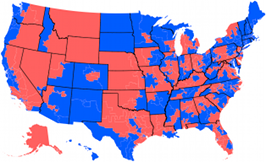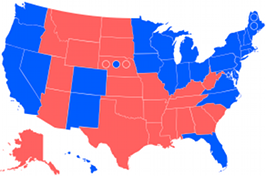Did Darrell Issa quit just in time? By counting the votes in California, we can see if there’s at least a blue wave in that state, even if nowhere else.
I said yesterday that there were three keys to the race. Let’s see how each one fared.
First, I said that both parties needed to keep from splitting the vote too much, or else they’d risk not advancing any candidates to November. It turns out the Democrats were split pretty evenly, with three candidates at 12, 16, and 17% as of this writing, with 83% of precincts in. However the Republicans were so concentrated that it didn’t matter. The top GOP candidates were at 26% and 9% as of this writing.
Second, it mattered whether this was a referendum on Issa, or on Trump. Republican Diane Harkey, the top vote getter, was endorsed by both GOP county parties in San Diego and Orange, Darrell Issa, and other local members of Congress. It does not appear that change from Issa was the motivating factor here.
Third, it mattered whether this was a wave election, with Democrats motivated (to beat Trump), and Republicans depressed (because of Trump). As of now, the answer appears to be yes. As of this writing, total Republican votes amount to 53,343. Democrats, led by Mike Levin, add up to 55,927.
Conclusion: Even if most of the country might not be seeing a wave, California is. Trump is toxic there, even with a number of Republicans. California small-government conservatism is incompatible with Trump’s big-government cronyism.
To be honest, they’re a bit concerned with the perceived white nationalism as well. When you grow up with people with names like Tran and Hernandez, as you do if you grow up in that part of California, Trump’s crowds looking out for White America just don’t sound right.


 House of Representatives Swingometer
House of Representatives Swingometer Electoral College Swingometer
Electoral College Swingometer